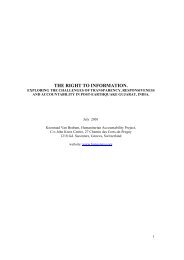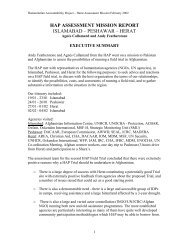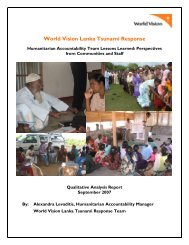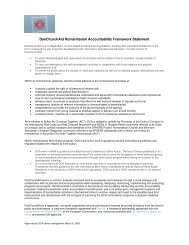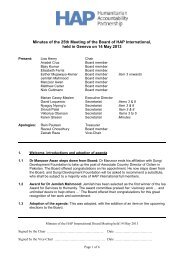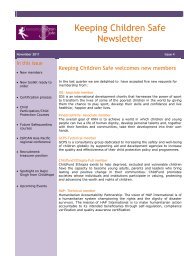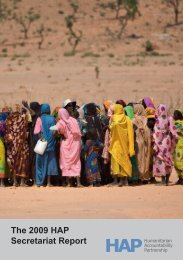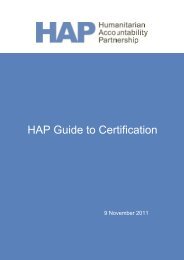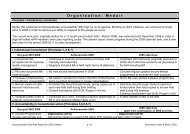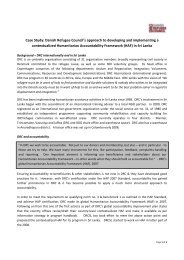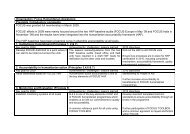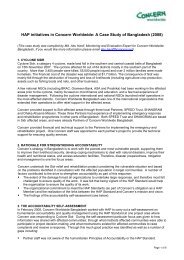Chapter Four - HAP International
Chapter Four - HAP International
Chapter Four - HAP International
You also want an ePaper? Increase the reach of your titles
YUMPU automatically turns print PDFs into web optimized ePapers that Google loves.
THE 2008 HUMANITARIAN ACCOUNTABILITY REPORT<br />
7. Church World Service Pakistan/Afghanistan<br />
Plans with regard to: undertaking a baseline analysis, a certification audit, or mid term certification review<br />
CWS Pakistan/Afghanistan will apply for certification before August 2009.<br />
Progress in / highlights from the field (if not otherwise covered above)<br />
CWS-P/A in partnership with two local NGOs, Punjab Lok Sujag and Bedari, opened a Consumer Complaint Centre by the name of MCH (Mansehra<br />
Consumer Helpline) with the sole purpose holding the service providers (governmental and non-governmental) accountable to the beneficiaries in an<br />
effective and efficient manner. The project was initiated in June 2007 with a total of 650 complaints being filed within the first six months. A detailed report,<br />
its objectives and achievements are available in “Accountability in Humanitarian Work”. This publication, along with two others is available on our partner’s<br />
website: www.bedari.org.pk.<br />
Summary / other comments<br />
CWS-P/A is fully committed to the principles of accountability and transparency at all levels of interventions and expects the same from its partners. CWS-<br />
P/A has made a commitment to the New Emergency Policy (NEP) and is making efforts to apply the <strong>HAP</strong> Principles of Accountability from the outset of all<br />
new humanitarian emergencies. The recent earthquake in Baluchistan provided us with an opportunity to implement the <strong>HAP</strong> Principles of Accountability,<br />
learn from the challenges and ensure quality assistance to the affected communities.<br />
8. DanChurchAid (DCA)<br />
Introductory comments: DCA was certified by <strong>HAP</strong> in June 2008. The DCA Humanitarian Framework prioritised the minor non-compliances in the<br />
certification as 2008-2010 action points. For most DCA staff, the issue of accountability (and how to realise it) is well known; complaint handling still presents<br />
a relatively new approach.<br />
Key goal for 2008 Achievements / challenges / lessons learned 2009 objectives<br />
1. A humanitarian quality management system (Principles 1, 2, 5 & 7)<br />
DCA’s Humanitarian Quality Management<br />
System (HQMS) known and respected.<br />
DCA HQMS was rolled out, but has to be revised<br />
given development certification.<br />
HQMS descriptions for all decentralised regional<br />
offices and HMA offices. (DCA Malawi model for<br />
use by all.)<br />
2. Information, Communication, Transparency (Principle 3)<br />
• Non-disclosure policy developed and<br />
disseminated.<br />
• <strong>HAP</strong> presentations and discussions at different<br />
ACT fora meetings in Malawi, Ethiopia, South Sudan,<br />
DCA regional offices will work to communicate<br />
more transparently via publicly available<br />
82<br />
107




